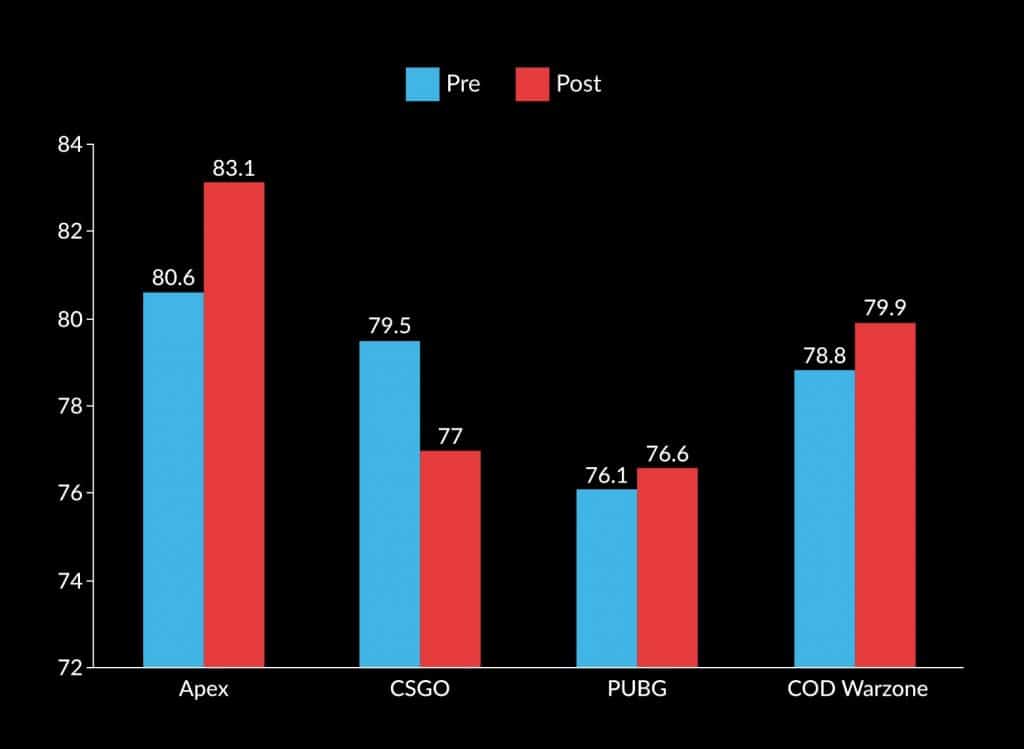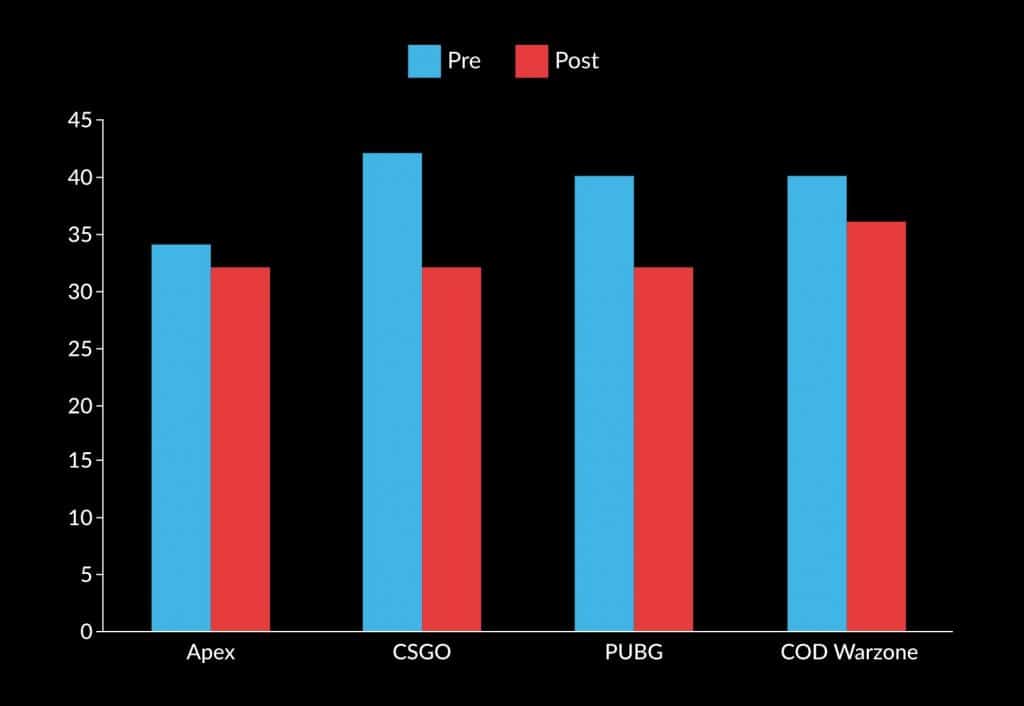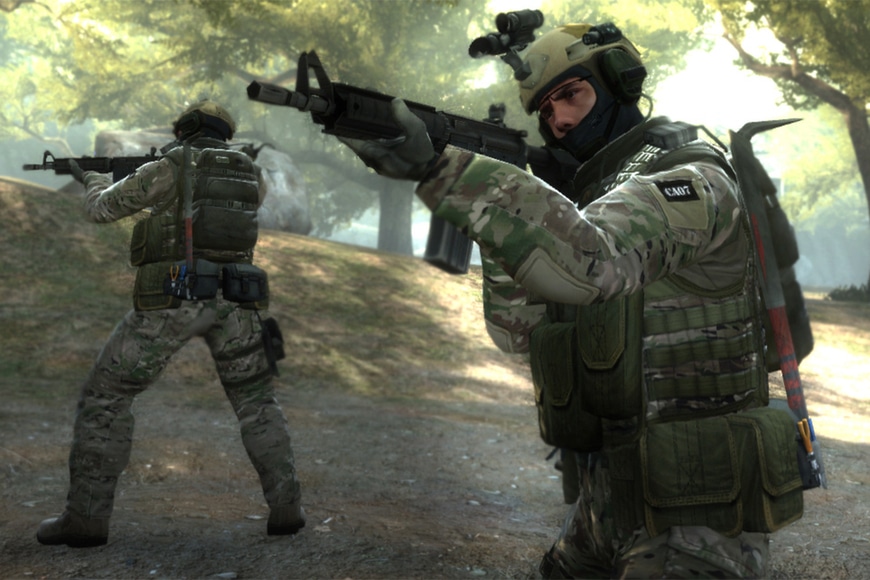For all its drama, smack-talking and screaming at LANs, Counter-Strike is apparently the most calming esports shooter out there.
That’s according to a new study from human biology and psychology researchers at the University of Leeds, which investigated the physiological effects of stress related to gaming.
The study by the UK university, commissioned by BetVictor, focused on popular FPS and battle royale games including Apex Legends, CSGO, Call of Duty Warzone and PlayerUnknown’s Battlegrounds (PUBG). The study tracked blood pressure and heart rate.
32 people took part aged between 20 and 26 years old (with an average age of 23.2), and each were identified either a ‘good’ player or an ‘expert’ in their game of choice. Most participants played one game, but some played two, and each were recorded playing the game on a minimum of three occasions.
For adults a normal resting heart rate is between 60 to 100bpm (beats per minute) but stress can trigger an elevated heart rate above 100bpm. In all four titles there was an elevation in heart rate that reached more than 100bpm on at least one occasion, with a higher heart rate fluctuation amongst participants when they encountered an enemy or challenge.
CSGO’s ‘standout results’
CSGO produced ‘standout results’ that differed from that of the other games, with players’ average heart rates dropping from 79.5bpm to 77bpm – making it the only game that saw the average decrease.

The researchers involved in the research suggested this may be due to the duration of the games.
“CS matches usually last between 30 minutes up to an hour, whereas gameplay time in other titles were almost half the durations of CS’ matches,” the report stated.
“The longer timespan as well as between-round resets, means that the gamers are more likely to settle into a natural rhythm and relax more than other games, unlike the shorter battle royale games that boast greater unpredictability in a shorter space of time.”
Another possible reason theorized by researchers involved in the study was that the participants playing CS were more experienced at playing this game and felt more relaxed throughout.
The decrease in the heart rate of the gamers playing CS, a physiological indicator that the gameplay had a relaxing effect, aligns with pre and post gaming questionnaires.
‘Little change in blood pressure’
Overall, the maximum recorded heart rates of participants never surpassed an unhealthy stressed heart rate (Max heart rate 220 – age). The highest recorded heart rate in the study was 140 bpm during a match in PUBG (PlayerUnknown’s Battlegrounds). While heart rates were elevated, they were within a healthy level of arousal.
Apex Legends saw the biggest average increase, with pre-game average bpm rising from 80.6 to 83.1, but the least heart fluctuation during gameplay possibly due to short matches.
“Now, you’d think that given the elevated heart rates recorded by our participants, they exit their game feeling stressed and slightly irritated,” the report stated.
“Wrong! The STAI (also known as ‘State Anxiety’) is a test used to measure anxiety at a particular point in time. It was here that our gamers reported feeling stressed prior to playing, and later demonstrated a dip in anxiety levels post-gameplay. This is in line with other research that suggests playing video games is seen as a relaxing activity. As with other findings, it was Counter-Strike that had the most dramatic impact on participants.”

Finally, across all games, there was very little change in blood pressure pre and post playing. This indicates that participants did not experience stress as a result of playing. Equally, blood pressure did not reduce. The report stated this may well be due to the fact that participants are relatively young and when pre-playing the video games their blood pressure was at an appropriate level, even if they reported feeling stressed on the STAI questionnaire.
Dr Andrea Utley, reader in motor control and development, commented: “It appears that participants view playing video games as an enjoyable activity that reduces their stress. Even if pre playing the game, physiological measures indicate that they are relatively relaxed, they still perceive that playing is a good form of stress release.”
Key findings
- All participants stated that gaming was stress reducing
- While gaming, participants’ heart rates were elevated across all games
- Higher heart rate fluctuations are related to in-game events, such as encountering an enemy
- Apex Legends had the highest average elevated heart rate but the least amount of heart rate fluctuation
- Playing Counter-Strike was perceived to reduce the physiological effects of stress
- It would appear the longer you play a game, the more heart rate fluctuates – this may be due to game intensity
- Years of experience playing a game may give greater stress reduction
- Blood pressure only dropped when playing Apex and that was only the systolic measurement
Top Gambling & Casino Guides
Explore some of our most popular casino, betting, and gaming guides, trusted by UK players this year.
- Best Online Casinos in the UK
- Best Crypto Casino Sites
- Top Online Betting Sites 2025
- No ID Verification Casino Sites
- Non Gamstop Casinos UK

Dom is an award-winning writer and finalist of the Esports Journalist of the Year 2023 award. He has almost two decades of experience in journalism, and left Esports News UK in June 2025.
As a long-time gamer having first picked up the NES controller in the late ’80s, he has written for a range of publications including GamesTM, Nintendo Official Magazine, industry publication MCV and others. He also previously worked as head of content for the British Esports Federation.


